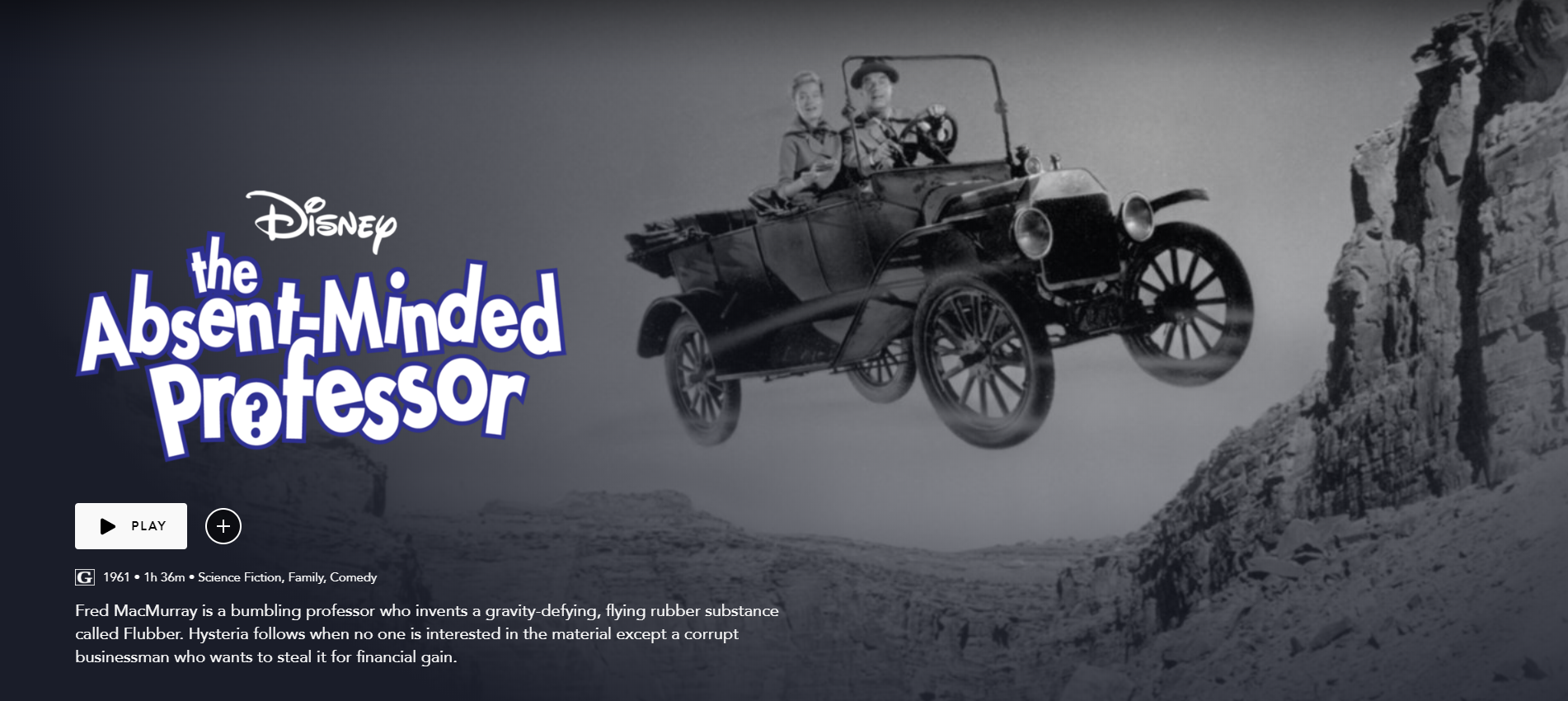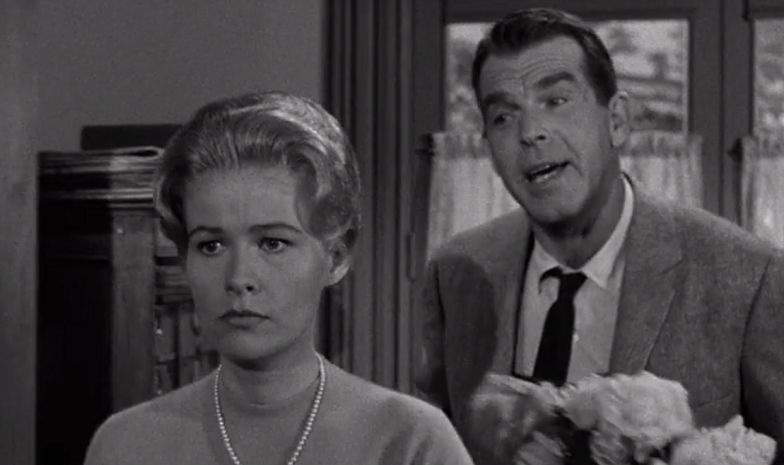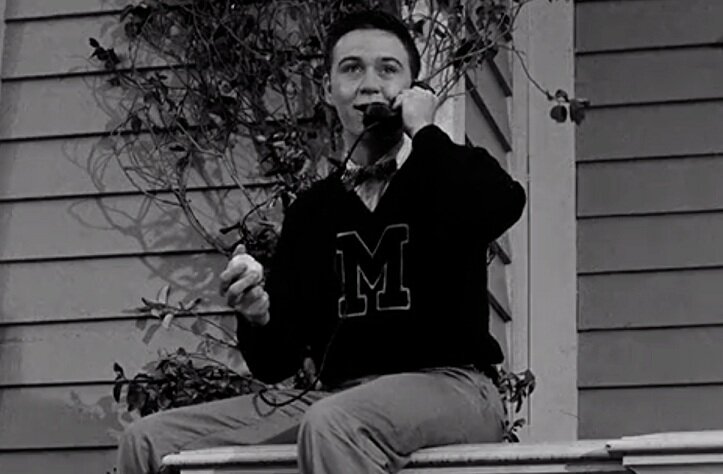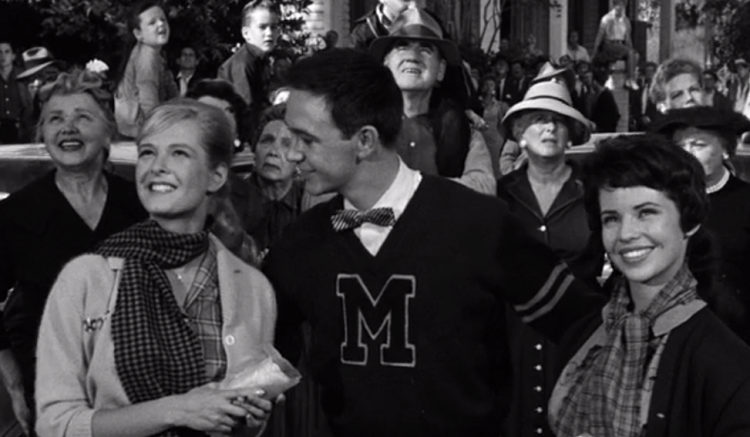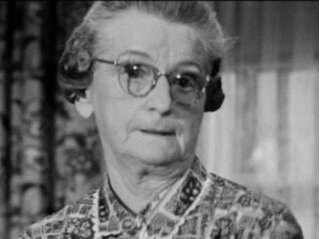Review: The Absent-Minded Professor (DMC #35)
What do you get when you attempt to solve the secrets of the universe? You get flying rubber—Flubber! Happy Friday, fellow Disnerds! We hope you’re all doing well and joined us as we watched The Absent-Minded Professor, the 35th film in the Disnerd Movie Challenge. Read on for our synopsis, or scroll further to get straight to the review.
Synopsis
Professor Ned Brainard is hard at work on a new experiment in his garage, when his housekeeper, Mrs. Chatsworth, interrupts to remind him not to be late to his wedding at 8:30 p.m. Meanwhile, Professor Shelby Ashton accompanies Miss Carlisle to her own wedding ceremony. This is the third attempt at a wedding after Professor Brainard failed to show up for the last two. Back at the professor’s garage, Mrs. Chatsworth leaves for the day after again reminding the professor about his wedding. Just as she leaves, the garage explodes from the professor’s experiment. Back at the would-be wedding, Miss Carlisle, unable to reach Professor Brainard, gets fed up and calls off the wedding, saying there won’t be another. When Professor Brainard comes to, he realizes the explosion created a levitating, bouncing material which he calls Flubber (flying rubber). He continues testing what Flubber can do well into the night, his wedding completely forgotten until Mrs. Chatsworth shows up the next day and tells him it’s now 8 a.m. and he completely missed his wedding—again. The professor rushes off to Medfield College to explain himself to Miss Carlisle and share his discovery, but Miss Carlisle tells him to leave, not wanting anything to do with him. Her boss, the president of the college, takes her side, trying to return to the matter at hand—the college doesn’t have the means to pay back the loans from Mr. Alonzo Hawk. Mr. Hawk and his son, Biff, soon arrive. After Professor Brainard unwittingly insults Mr. Hawk and Biff, who flunked Professor Brainard’s class and now can’t play in the big game, Mr. Hawk swears he will sell the college.
Desperate to win back Miss Carlisle, the professor installs Flubber in his car and takes it for a test flight. He stops at Miss Carlisle’s home, intending to take her to the big game, but Professor Ashton is there to escort her instead. At the basketball game, Medfield is losing badly to their rival, Rutland. Professor Brainard gets an idea—he irons Flubber to the bottom of the Medfield players’ shoes and switches them out at halftime. The team finds they can leap higher than ever, and they soon win the game. While Professor Brainard tries to take credit for the win, Miss Carlisle and Professor Ashton think he’s full of it. Professor Brainard follows Professor Ashton after he drops off Miss Carlisle, and bounces his flying car on top of Professor Ashton’s car, causing Professor Ashton to drive like a drunk and get pulled over by the police. Meanwhile, Mr. Hawk and Biff spot Professor Brainard flying his car. The Hawks visit Professor Brainard at home where Mr. Hawk tries to bribe Professor Brainard to share his discovery. The professor refuses, however, and instead vows to take the discovery to the president of the United States. Biff suggests they switch cars on the professor to steal his discovery.
After getting the runaround from different government agencies, the professor is ready to accept defeat professionally and romantically, but Mrs. Chatsworth urges him to go to the dance and win back Miss Carlisle. After parking his car at the dance, however, the Hawks swap the professor’s car for another. At the dance, three government officials arrive wanting to see the professor’s discovery. The flight demonstration fails, due to the cars being swapped. Miss Carlisle feels sorry for the embarrassed professor, and finally believes him about his discovery. Together they trick Mr. Hawk into telling them where the real car is by giving him a pair of Flubber shoes and leaving him bouncing ever higher outside the Hawk residence. Together they break into Mr. Hawk’s warehouse and steal back the car, flying it to Washington, D.C. while escaping Mr. Hawk and his goons. As Professor Brainard and Miss Carlisle fly over Washington, the Air Force spots the flying car on their radar and threatens to shoot it down. One of the government officials that came to the dance realizes what’s happening and calls off the attack. In a press conference, the President of the United States embraces the discovery of Flubber, honoring Professor Brainard. The film ends with Professor Brainard and Miss Carlisle finally getting married.
Thoughts Before Watching
Megan: My family had an old VHS recording of The Absent-Minded Professor. I think it must have aired as part of the Wonderful World of Disney or something so that we were able to record it. It’s been ages since I last saw it (or anything on a VHS tape for that matter). I remember thinking the professor and the dog were funny, and that Flubber was a cool invention because it bounced everywhere and made things fly. I don’t really remember much of the plot, though, beyond the professor discovering Flubber. I honestly don’t really remember the other characters, either. I’m looking forward to seeing this one again.
Kevin: This is another completely new one for me. I actually didn’t realize the 1997 film Flubber was a remake of this until Megan told me. Though I saw Flubber years and years ago, and though I’d heard of The Absent-Minded Professor, I was not at all familiar with the story of the latter so I never made the connection. It’s got Fred MacMurray, who was in The Shaggy Dog and who I thought had some of the best moments in an otherwise dull movie, so I’m interested in whether I’ll like this one any better.
Thoughts After Watching
A largely forgettable movie
Megan: It turns out there was a LOT about this movie I didn’t remember—especially the later half of the movie. I don’t know if I simply got bored watching this as a kid and wandered off to do something else, or if perhaps we didn’t even record the full movie on that VHS tape. Whatever the case, it still stands that the professor’s discovery of Flubber and the initial antics of him testing it out are the most memorable parts of the movie. That said, the basketball game goes on far too long. I definitely remembered that the underdog basketball team would be victorious because of Flubber on their shoes, but watching scene after scene of the game had me losing interest. Also, the film’s climax feels a bit weak because they defeat Mr. Hawk a bit too soon and then suddenly have to face a new antagonist: the government. Since the government hadn’t been fully established as an antagonistic role, the final confrontation in the skies above Washington, D.C., seems to come out of left field. Even when that confrontation is solved, we still don’t get a proper resolution. It feels rushed and artificial that the president is suddenly pardoning the professor, and then we’re witnessing the wedding of Miss Carlisle and Professor Brainard. We don’t even get final confirmation that the college will be safe from Hawk’s redevelopment plans. While the movie magic of Flubber and the flying car must have thrilled audiences of the ‘60s, I don’t think such a film would even make it to theaters given contemporary audience expectations. I can’t remember much of the ‘90s remake Flubber, so it’s hard to say if that version did better than the original, but I do know that any future remakes would have their work cut out for them to not only modernize the context of the story, but also restructure the plot and further develop the characters to win over today’s audiences.
There are no likable characters to be found here
Kevin: To put it bluntly, the major characters are unlikable. It’s not to say I didn’t laugh at some of the humor, but when you really get down to it there are glaring issues with the main characters so it’s hard to root for any of them. First, there’s Professor Ned Brainard. He’s stubborn and selfish, often doing things just for himself. The way he behaves toward Mr. Hawk and Professor Shelby Ashton is just as awful as they behave toward him. The movie attempts to paint Professor Brainard as the misunderstood hero who is simply fighting off the bad guys, but it really doesn’t come off that way. Instead, it’s just another tired trope of men trying to outdo one another. Some of it was funny, but a lot of it got old. Further, Professor Brainard is really rude to people whom he should be on good terms with, including his housekeeper and his boss, President Daggett. Another issue is that Professor Brainard doesn’t take “no” for an answer, such as refusing to leave Miss Carlisle alone after she continues to tell him to. He’s also completely inattentive to the point of total annoyance. “But, Kevin—he’s absent-minded!” Yes, yes he is, but this quirk stops being interesting when it leads to the further deterioration of his relationship with Miss Carlisle.
Speaking of Miss Carlisle, she, too, has some issues. She’s unfortunately treated as “a prize to be won” between Professor Brainard and Professor Ashton, in spite of having zero reasons to like or be with either man. It was disappointing that she chose Professor Brainard in the end. It was one thing for her to finally believe that Flubber was real and have some sort of reconciliation with the professor, but did it have to be marriage? I have a hard time buying that anyone stood up at the altar once, let alone thrice, would go through the experience with the same person again. I could see an exception if there were extreme circumstances that would prevent one from attending their own wedding (short of death), with a serious discussion needed between the marrying partners to decide if the circumstances were excusable. That doesn’t happen here, and I’m lost as to why Miss Carlisle would go through with it. I think it would have sent a better message to allow the two to part on amicable terms as they realize they’re not the best partners. But this is Disney, specifically early ‘60s Disney, and heaven forbid that relationships don’t work out in the end. It was a time when separation and divorce were taboo subjects, while marriage was considered practically a duty, especially for young American women. So while it’s incredibly unfortunate, I suppose it’s not entirely surprising the writers went in this direction. As with Swiss Family Robinson, we have another example of an actress who had a much better role in a previous movie. In this case, Nancy Olson was treated better when she played Nancy Furman in Pollyanna.
Megan: Not to mention Nancy Furman had a much more likable love interest!
Kevin: Then there is Professor Shelby Ashton. His whole character is summed up in his first scene, where we see him actively pursuing Miss Carlisle while she is getting ready for her wedding! His pretentiousness is important to note here. It’s irrelevant that Professor Brainard misses the wedding a third time and irrelevant that he hasn’t been a good partner to Miss Carlisle—it is not okay to pursue people, single or taken, when they have made it clear they are not interested. What’s worse is that he keeps doing it again and again throughout the film, stubbornly believing she will somehow fall for him because he smugly thinks he’s such a catch. This love triangle with Professor Brainard, Miss Carlisle, and Professor Ashton is probably one of the worst ones we’ve seen so far.
All right, I’ll try to end on a happier note. The Hawks, Alonzo and Biff, are just slightly more likable than the other characters. I admit that Tommy Kirk in an antagonistic role as Biff was actually one of the highlights for me. His character may be the only one that I liked, or at the very least the only one I did not roll my eyes at or get annoyed with. I think he played his role well; Biff is snotty and smug, going along with his father’s schemes and having his own moments of “evil-doing.” However, for the most part he seems like an awkward teenager just trying to please his demanding father. His redeeming qualities come from not wanting to actually hurt anyone or see his school closed, so he just barely, barely passes on account of being only slightly less evil than his father. Plus, there’s just the fantastic scene where Biff halfheartedly tries to get stop his father’s bouncing but uses it as an opportunity to flirt with the girls of the town. As for Alonzo Hawk, well, he sort of gets a pass just because he’s supposed to be unlikable—he’s the bad guy! But the actor, Keenan Wynn, does such a wonderful job in the role with a comedy of his own that differs from that of his father, Ed Wynn (who had a role in here as the Fire Chief and was famous for voicing the Mad Hatter). In this case, I can buy the elder Hawk’s actions, however over-the-top they may be.
Being a product of its time is not an excuse
Megan: While it’s clear that the general cultural views of the 1960s do not match today’s views, it’s become clear to me in watching our way through Disney’s catalog that some films during this time period were better than others when it comes to the depictions of women. After seeing some films that have done a better job, like Pollyanna for instance, it’s frustrating to watch a film that seems to go backwards in progress.
The Absent-Minded Professor definitely isn’t winning any awards for the depiction of female characters. There is but one single exchange in the entire film where two women talk to each other about something that is not explicitly a man:
MISS CARLISLE: Oh, it was so sweet of you to go to all this trouble—and for the third time, too.
MRS. DAGGETT: Well, you know the old saying: third time’s the charm!
That’s it. That’s the single exchange that technically means this film passes the Bechdel test since the women are talking about Miss Carlisle’s wedding. However, even in this exchange, a male is implied—they wouldn’t be doing this for the third time if Professor Brainard had actually showed up to his own wedding one of the two times prior. For this reason, I personally don’t feel like it passes the test. It also doesn’t help that this exchange is followed by Miss Carlisle’s boss, President Daggett, saying “Well, I’m sick and tired of having a spinster for a secretary.” I’m sorry, but what does Miss Carlisle’s marital status have to do with her job? How is a single, unmarried woman as your secretary worse than a married woman as your secretary? Especially when you consider that women used to quit their jobs as soon as they got married, it would seem that having an unmarried secretary would be preferable (unless, of course, he was worried about perceived impropriety of an older, married man with a young, single woman as a secretary, but that’s a whole different can of worms…).
Miss Carlisle and her righteous indignation
Megan: Still, the women of this film do manage to hold their own, if only in small ways. For one thing, Miss Carlisle is rightfully mad at Professor Brainard when he misses his wedding for the third time in a row and she declares “three strikes you’re out!” to the guests at the ceremony. (I’m personally wondering how a professor so married to his work ever managed to land a date in the first place, let alone manage to propose.) Miss Carlisle’s anger is completely justified, and we would not fault her if she wanted to take the next day off of work to grieve what she now sees as the end of the relationship. However, she insists on reporting to work the next day. When Professor Brainard appears at her workplace, she makes it very clear to him that she wants nothing to do with him, and that he’s harassing her at work, which could risk her losing her job. One of her best lines in this exchange is “the most wonderful thing you can tell me is ‘goodbye!’” Here is a man who (1) missed his own wedding three times in a row, (2) harasses Miss Carlisle at work after the third missed ceremony, and (3) is so self-absorbed he can’t even apologize for what happened because he’s too caught up in his “excuse” and his own ego about his discovery. It’s no wonder Miss Carlisle decides to go out with Professor Ashton! While it’s clear Miss Carlisle isn’t exactly crazy about Professor Ashton, she knows going out with him is a perfect way to get back at Professor Brainard for all the trouble he caused her. Of course, ultimately, she does marry Professor Brainard, much to the confusion of modern audiences. It’s clear that Miss Carlisle’s role in this film is merely to serve as part of Professor Brainard’s redemption arc, even if he hardly changes over the course of the film. It’s yet another example of the male point of view influencing how this story is told. I’m sure if a woman were to retell this story we’d get more of Miss Carlisle’s reasons for her decision, if only that she was suddenly okay with marrying someone so self-absorbed because his discovery just made him incredibly wealthy.
Mrs. Chatsworth, a champion for other women
Megan: Of everyone in this film, I think Mrs. Chatsworth is my favorite (perhaps tied with the dog, Charlie). Though she and Miss Carlisle never have a moment on screen together, Mrs. Chatsworth does everything in her power to support Miss Carlisle by trying to get Professor Brainard to his own wedding on time, and later by convincing him to go to the dance. From the beginning she knows that Miss Carlisle could have had her pick of men, and she even tells Professor Brainard (albeit under her breath) that Miss Carlisle deserves far better than him. However, she respects Miss Carlisle’s choice and does what she can to support that choice. When the professor is ready to give up, Mrs. Chatsworth is the one who gives him a talking to, saying “the universe is millions and millions and millions of years old. It can wait a little. But girls can’t wait.” And then later, “even a chimpanzee will fight for its mate.” While I’m still not a fan of men fighting over a woman in any context, I love that Mrs. Chatsworth uses that chimpanzee line as a not-so-subtle jab at the professor, because honestly, by this point in the film, she’s fed up with him, too.
A prime example of how domestic work enables other types of work
Megan: Honestly, if it weren’t for Mrs. Chatsworth, it’s clear that Professor Brainard would not survive. Though Mrs. Chatsworth seems to be paid for her services, she’s a prime example of how the chronically undervalued domestic work that too often falls to women is absolutely essential to allow the type of work society places a higher value on, such as scientific discovery. If Professor Brainard hadn’t hired Mrs. Chatsworth, it’s quite likely he would have worked himself to death, completely forgetting to eat or sleep. His home would likely be a shambles—dirty dishes and dirty clothes everywhere, probably covered in dust and science experiments… Heck, his own dog probably would have died on his watch! (I’m still personally concerned that he was experimenting with gamma rays without any protective equipment and in such close proximity to his dog.) Of course, if the professor had taken on more of the household duties himself, one could argue he might never have discovered Flubber, but perhaps that version of the professor also wouldn’t have missed his own wedding three times in a row, so personally I find that preferable. Unfortunately, Professor Brainard doesn’t seem to realize how valuable Mrs. Chatsworth is to his own scientific pursuits. Though he is generally kind to Mrs. Chatsworth, he doesn’t seem all too appreciative of her work, whether it’s the domestic work of keeping his home livable or the emotional work of advising him in his relationship with Miss Carlisle. It’s easy to predict how Miss Carlisle might find herself filling the role of Mrs. Chatsworth after marrying Professor Brainard, only in her case it would be unpaid work.
Wacky science can be funny, but not enough to save the film
Kevin: So, yes, there are a few funny moments scattered throughout the movie that got a chuckle out of me. The basketball scene, while eventually getting boring, was fun to watch for the first couple minutes. The scene with Mr. Hawk bouncing up and down in his neighborhood was hilarious if only because of the reactions of everyone around him, including his son and the town fire chief. Really, the funniest moments all had to do with Flubber and less with the characters. I’ve read some criticism towards Flubber’s nature and how it doesn’t obey the laws of physics at all, let alone its own physics established in the movie. There’s also the fact that a lot of Professor Brainard’s experiments would more than likely be rejected. Take this line for example:
“So, the molecular configuration of ‘A’… is almost the same as that of ‘B.’ Therefore, if I just don’t worry about ‘A’ throwing off a little free hydrogen, it could stand a few degrees more centigrade.”
I’m not a scientist, but I know enough to understand that a good experiment isn’t this vague, generally avoiding words like “almost,” “a little,” and “a few,” and instead using specific quantities. It very much comes off as the writers just throwing in some words that sounded cool. The criticism against the science of this movie is fair, because my suspension of disbelief was stretched pretty far. All of that said, though, I really had no real issue with the phony science. It made for some entertaining moments of pure silliness. The film wasn’t trying to be educational at all, and it breaks the rules so much I would hesitate to even consider it science-fiction in any sense. It could be a problem if someone actually believed the movie was displaying real physics, but I’d be incredibly stunned if that happened. Honestly, I think the idea of Flubber is just simple fun. Audiences apparently loved it back in the day, and according to the Walt Disney Family Museum website, Time magazine even released a fake recipe:
“To one pound of salt water taffy add one heaping tablespoon polyurethane foam, one cake crumbled yeast. Mix till smooth, allow to rise. Then pour into a saucepan over one cup cracked rice mixed with one cup water. Add topping of molasses. Boil till it lifts and says ‘Qurlp.’”
That’s some dedication. Although, I once again hope that if anyone tried this they would realize it was a joke.
Still, none of the above makes The Absent-Minded Professor all that great. The bits of humor throughout only just keep it from the bottom of the barrel, but that’s not saying much. The lack of any real relatable characters makes this hard to enjoy, and if I can’t find a reason to like the main character it’s hard to stay invested in the story. If the filmmakers had given as much thought to its characters as it did Flubber itself, this might have fared better.
